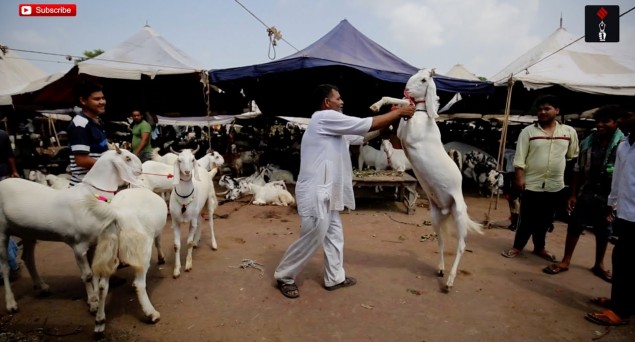Coronavirus Pandemic: 'Qurbani' An Uphill Task In India, 'Online' Sale And Purchase Of Sacrificial Animals In Bangladesh, Pakistan
Syed Ali Ahmed | India Tomorrow
NEW DELHI, JULY 8—Sacrifice of animals or ‘Qurbani’ on the occasion of Eid-ul- Azha may be an uphill task for the Muslims this year as the Municipal Corporation of Delhi and local police have yet not given permission for the decades old goat market at Jama Masjid that once upon a time used to supply animals to entire national Capital. Meanwhile, the officials in neighbouring Bangladesh and Pakistan have gone for ‘online’ sale and purchase of sacrificial animals.
Live stock market (goat and buffalo) at Ghazipur, near Ghaziabad, that is part of the only slaughter house in Delhi, has also not reopened after it was closed down when lockdown was implemented on March 24 to check the spread of coronavirus in the country.
Not only Delhi, Muslims of Kashmir and Ladakh may also not get animals for sacrifice as goat and sheep were supplied to the Kashmir valley from the Delhi market only.
The same situation prevails in the rest of the country as well with regard to ‘Qurbani’ this year.
Secretary of goat market at Jama Masjid Jamal India Tomorrow that he had approached the authorities two months ago seeking permission for operating the goat market for the festival of Eid-ul-Azha but the North Delhi Municipal Corporation (NDMC) and the local police denied the permission on the pretext of COVID 19. Jama Masjid is the oldest goat market in Delhi where lakhs of animals are brought from Uttar Pradesh, Haryana, Rajasthan and Madhya Pradesh. Animals are available at reasonable rates in this market.
Goat farming is a major source of income for many farmers in these states. Throughout the year they wait for Eid-ul-Azha and Delhi is the main market where the farmers get good prices. Not only Muslims are engaged in this business of livestock rearing, non-Muslims are equally involved. If permission for livestock market is not granted, livestock farmers and traders will suffer huge financial losses. Moreover, only a few weeks’ time is left as the Eid-ul-Azha falls on August 1, 2 and 3 and the government needs to take a decision immediately in this regard.
President of the Delhi Meat Merchant Association Arshad Qureshi said that the government should immediately give permission for reopening of the livestock markets in Delhi and the neighbouring states should allow transport of goats and other animals to ensure that people don’t face problem in celebrating the festival of Eid-ul-Azha.
He said that with the expansion of Delhi, new goat markets have developed at Batla House, Jafrabad and Tughlakabad where large number of Muslims reside. Dhobi Ghat is a place in Batla House where every year a proper goat and buffalo market is held to supply animals for entire Jamia Nagar, Shaheen Bagh, Jasola, Madanpur Khadar, Jaitpur, and Badarpur areas. Lakhs of Muslim families reside in these areas. This is a stretch of about 10 kilometres from Zakir Nagar to Jaitpur on Haryana border.
AAP MLA Amanatullah Khan and Congress Councillor Aley Mohammad, when questioned about the reopening of the livestock markets of Delhi, refused to comment.
NDMC Mayor Jai Prakash, when asked, said that the permission was not given due to COVID 19. “Thousands of people go to the goat market for purchase of animal for sacrifice. It is difficult to maintain social distancing in the market. Not only Eid-ul-Azha, other festivals were also not celebrated this year due to COVID 19. This has been done for the protection of citizens”, he said.
JIH & JUH Appeal Authorities To Help Muslims To Perform 'Qurbani'
Meanwhile, several Muslim organisations including Jamaat-e-Islami Hind(JIH) and Jamiatul Ulema-i-Hind have appealed the authorities to take steps so that Muslims could celebrate the festival of sacrificing animals without any obstruction.
Sharia Council of Jamaat-e-Islami Hind has also said that if the people are unable to do ‘Qurbani’ despite their desire and efforts because of official restrictions and other impediments, they should give ‘sadaqah’(charity) of an amount equivalent to the cost of sacrifice. However, the JIH made it clear that charity or some social services can never become a replacement to the deed of ‘Qurbani’. Charity in lieu of ‘Qurbani’ has been recommended only in extreme cases if ‘Qurbani’ of animals is not possible at all.
'Online' Market For Sacrificial Animals In Bangladesh, Pakistan
According to media reports, in neighbouring Bangladesh, the government has launched a digital ‘haat’ for online sale and purchase of sacrificial animals in view of the corona pandemic. The government has launched a portal on which people can sell and buy the animals and the government would arrange transport of the sacrificial animals through trains and other mode of transport to avoid crowding and check spread of corona. The Government of Bangladesh has taken the initiative so that cattle farmers and traders don’t suffer financial loss and the requirement of the people for sacrificial animal is also fulfilled.
The media reports say that the government in Pakistan is also not allowing cattle markets on the occasion of Eid-ul-Azha to contain the coronavirus. However, many religious organisations and NGOs are reported to have come forward to book ‘online Qurbani’ which would be done at distant places and meat would be distributed to all those who book the ‘Qurbani’ online and make the payment. There are several big cattle traders who are also booking ‘online Qurbani’, a new trend that has developed due to Covid-19. But ‘online Qurbani’ has invited criticism from certain religious groups in that country who are of the view that Qurbani is an obligation on individuals to perform it with their own hands and people should not depend on NGOs etc.







You might like